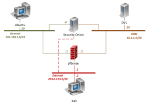We recommend that you use the latest version, NDG Security+ v3, when starting a new class.

NISGTC Security+ - Developed in collaboration with the DOL NISGTC, these labs focus on the principles and best practices in network security. Students gain hands-on practice in the skills needed to secure a network and prepare for industry certification.
NISGTC Security+ labs are supported in NETLAB+ using the Security+ Pod.
These labs are also available as an NDG Online hosted lab offering.

This work by the National Information Security and Geospatial Technologies Consortium (NISGTC), and except where otherwise noted, is licensed under the Creative Commons Attribution 3.0 Unported License.
Development was funded by the Department of Labor (DOL) Trade Adjustment Assistance Community College and Career Training (TAACCCT) Grant No. TC-22525-11-60-A-48; The National Information Security, Geospatial Technologies Consortium (NISGTC) is an entity of Collin College of Texas, Bellevue College of Washington, Bunker Hill Community College of Massachusetts, Del Mar College of Texas, Moraine Valley Community College of Illinois, Rio Salado College of Arizona, and Salt Lake Community College of Utah.
This workforce solution was funded by a grant awarded by the U.S. Department of Labor's Employment and Training Administration. The solution was created by the grantee and does not necessarily reflect the official position of the U.S. Department of Labor. The Department of Labor makes no guarantees, warranties or assurances of any kind, express or implied, with respect to such information, including any information on linked sites, and including, but not limited to accuracy of the information or its completeness, timeliness, usefulness, adequacy, continued availability or ownership.
Security+ labs are supported in NETLAB+ using the Security+ (SECPLUS) Pod.
To enable the Security+ labs, check the box for "NISGTC Security+" in the class settings. This must be done for each class requiring access to the labs.

Always select the correct lab exercise for the lab being performed. Students or teams should schedule the correct lab exercise from the catalog. NETLAB+ will only show those labs for which the required pod type is available. A lab that works on different pod types may appear more than once if your system is so equipped. Instructors should select the correct lab from the Exercise tab during instructor-led lab reservations. This can be done as many times as needed during the reservation.
Importance of Choosing the Correct Lab Exercise
Several of the labs may differ from the standard pod topologies. This is
handled by NETLAB+ Dynamic VLAN Mapping technology. Always select the
correct lab exercise for the actual lab. This insures that NETLAB+
will set up VLANs on the control switch such that lab devices and PCs are
placed in the correct LAN segment for the exercise being performed. Selecting
the correct exercise will also make the completed lab output easier to find in
the archive.
| Lab | Title | Objective(s) |
|---|---|---|
| 1 | Network Devices and Technologies - Capturing Network Traffic |
|
| 2 | Configuring the pfSense Firewall |
|
| 3 | Protocols and Default Network Ports - Connecting to a Remote System |
|
| 4 | Secure Implementation of Wireless Networking |
|
| 5 | Incident Response Procedures< |
|
| 6 | Secure Network Administration Principles Log Analysis |
|
| 7 | Analyze and Differentiate Types of Attacks and Mitigation Techniques |
|
| 8 | Mitigation and Deterrent Techniques – Password Cracking |
|
| 9 | Identifying & Analyzing Network/Host Intrusion Detection System (NIDS/HIDS) Alerts |
|
| 10 | Analyze and Differentiate Types of Malware & Application Attacks |
|
| 11 | Discovering Security Threats and Vulnerabilities |
|
| 12 | Importance of Data Security – Securing Data Using Encryption Software |
|
| 13 | Analyzing Types of Web Application Attacks |
|
| 14 | Authentication, Authorization and Access Control |
|
| 15 | Implementing Common Protocols and Services for Basic Security Practices |
|
| 16 | General Cryptography Concepts |
|